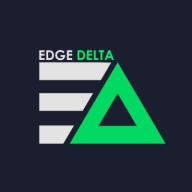

Cribl and Edge Delta are both data observability platforms. Cribl seems to have the upper hand in diverse data management with its flexible routing and transformation, while Edge Delta offers superior real-time analytics and automation for rapid insights.
Features: Cribl provides capabilities like data enrichment, data collection, and lowering data costs with routing capabilities. Edge Delta offers powerful real-time analytics, robust monitoring, and comprehensive automation tools.
Ease of Deployment and Customer Service: Cribl offers a user-friendly deployment process and responsive customer support, enabling quick integration into various ecosystems. Edge Delta provides seamless cloud deployment with extensive support resources, streamlining deployment for digital-first organizations.
Pricing and ROI: Cribl provides competitive pricing with flexible licensing options for significant cost savings on data infrastructure. Edge Delta emphasizes a robust ROI through efficient data processing, appealing to organizations seeking high-performance analytics.
| Product | Market Share (%) |
|---|---|
| Cribl | 1.2% |
| Edge Delta | 0.4% |
| Other | 98.4% |

| Company Size | Count |
|---|---|
| Small Business | 9 |
| Midsize Enterprise | 5 |
| Large Enterprise | 18 |
Cribl offers advanced data transformation and routing with features such as data reduction, plugin configurations, and log collection within a user-friendly framework supporting various deployments, significantly reducing data volumes and costs.
Cribl is designed to streamline data management, offering real-time data transformation and efficient log management. It supports seamless SIEM migration, enabling organizations to optimize costs associated with platforms like Splunk through data trimming. The capability to handle multiple data destinations and compression eases log control. With flexibility across on-prem, cloud, or hybrid environments, Cribl provides an adaptable interface that facilitates quick data model replication. While it significantly reduces data volumes, enhancing overall efficiency, there are areas for improvement, including compatibility with legacy systems and integration with enterprise products. Organizations can enhance their operational capabilities through certification opportunities and explore added functionalities tailored towards specific industry needs.
What are Cribl's most important features?Cribl sees extensive use in industries prioritizing efficient data management and cost optimization. Organizations leverage its capabilities to connect between different data sources, including cloud environments, improving both data handling and storage efficiency. Its customization options appeal to firms needing specific industry compliance and operational enhancements.
Edge Delta provides an innovative approach to data analysis using distributed intelligence to process log data at the source, enabling real-time insights without centralized bottlenecks.
Edge Delta stands out by empowering users to gain actionable insights through a decentralized model that analyzes data locally. This reduces overhead, enhances speed, and ensures more reliable insight delivery. The approach supports scalability and aligns with modern data-driven strategies, making it an excellent choice for organizations seeking advanced capabilities in log data processing and event monitoring.
What are the standout features of Edge Delta?In industries like finance and telecommunications, Edge Delta aids in managing vast amounts of transactional data, enhancing real-time fraud detection, and improving customer service through efficient operations. In tech sectors, it contributes to maintaining system integrity and swift troubleshooting. This versatility makes it valuable across different sectors seeking dynamic data management solutions.
We monitor all Application Performance Monitoring (APM) and Observability reviews to prevent fraudulent reviews and keep review quality high. We do not post reviews by company employees or direct competitors. We validate each review for authenticity via cross-reference with LinkedIn, and personal follow-up with the reviewer when necessary.